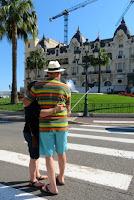“Nudge nudge, wink wink. Monaco eh?” You know what’s coming next, that well-known and often misquoted phrase by W. Somerset Maugham [1]. And he must have known what the people are like, having lived on the Cote d’Azur for around 40 years.
Maugham is just one of many writers who have immortalized life on the French Riviera through fiction. He provides a glimpse of expat socializing between the wars in his book The Razor’s Edge. The character Elliott Templeton throws splendid parties in Antibes, has “the best cuisine on the Riviera,” and entertains “with a magnificence that never overstepped the bounds of good taste.” His guests are “royalties from all parts of Europe: some lured there on account of the climate, some in exile, and some because of a scandalous past or an unsuitable marriage.” Sadly, Elliott’s extravagant generosity does not buy friendship and as he grows old and infirm his aristocratic acquaintances desert him. Their behaviour is not so much shady as shoddy.
Maugham himself was allegedly fictionalized in Anthony Burgess’s chef d’oeuvre, Earthly Powers. Burgess moved to Monaco in the mid-1970s and his character Kenneth Toomey lives there for a while as a writer. He visits the Casino and is treated to a lavish, gourmet meal in the Hotel de Paris. The wealthy residents live a life of leisure, seabathing in Menton or Beaulieu and “playing tennis back in the Principality in the late afternoon with some nice harmless English people.” Further down the coast, Nice was not so friendly and in one distressing episode, Toomey is attacked outside a bar in the port. The city is still considered to be somewhat edgy by residents of more genteel coastal towns.
Turn of the century Cote d’Azur was used as a setting by Edith Wharton, who traveled extensively in Europe in the late 19th century. Following her divorce she spent her winters in Hyeres. In The House of Mirth she paints a vivid picture of wealthy American tourists visiting Monaco, where “ladies stood in unrelated attitudes calculated to isolate their effects, and [-] men hung about them as irrelevantly as stage heroes whose tailors are named in the programme.”
The same people had difficulty deciding where to eat lunch, the food being a “minor consideration.” More important were the clientele, “who their dress-makers are,” and the fact that the “Grand Dukes go to that little place at the Condamine.” These days they would be asking where the celebrities go.
After lunch the group “dispersed with the loitering indecision characteristic of social movements at Monte Carlo, where the whole place, and the long gilded hours of the day, seem to offer an infinity of ways of being idle.” Throughout summer similar characters will be using Casino Square as their stage, taking selfies at the Cafe de Paris, more concerned with how they look on Instagram than with what’s in front of them.
Sources
W. Somerset Maugham, The Razor’s Edge (1944)
Anthony Burgess, Earthly Powers (1980)
Edith Wharton, The House of Mirth (1905)
[1] The Riviera isn't only a sunny place for shady people. Strictly Personal, p. 156 (Doubleday, Doran and co., inc., 1941)

No comments:
Post a Comment